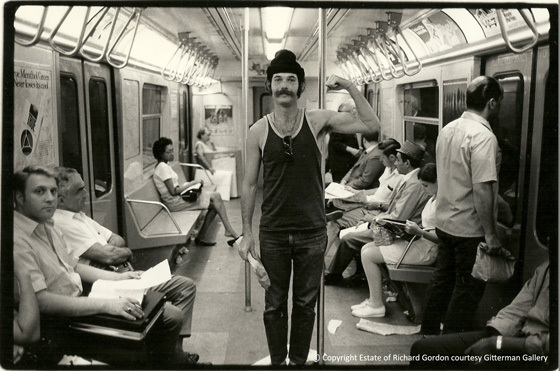I remember walking with two of my friends, Kenny and Richard, on Park Avenue in New York. It was the late 1960s and we were straight out of central casting with beards, long hair and mustaches -- a look that we hoped told all the suits that we were rebels. We were all in college or had been in college, had degrees or eventually would have degrees. I looked at Kenny and Richard, both of whom had been students at the prestigious University of Chicago, saw how different we were from the people walking past us, and half-jokingly said, "Look at us. We're freaks. Who's going to run the country?" If our entire generation was anti-establishment, who was going to be the establishment, I wondered? Who was going to collect the garbage and run the businesses?

Kenny on the F Train to Queens
Needless to say, it all worked out and not much has changed. Kenny's friend from camp, Ralph Lifshitz, became well... Ralph Lauren. Kenny would eventually own a very successful restaurant, and Richard became a highly regarded photo journalist. A year later, at the age of 22, I had a child and was teaching English in a Junior High School in Brentwood, Long Island. But my rebel's spirit, especially in education, stayed with me.
Like many of the other teachers of my generation, I was media obsessed. I brought television, movies and rock music into the classroom. Collectively, we created the media literacy movement. We watched the film version of To Kill a Mockingbird with our students, then read the book and did cross-media analysis with them as well. We made our own movies, and some of the wealthier school districts got television cameras and produced their own morning news broadcasts. I used music lyrics to teach poetry, playing "She's Leaving Home" by the Beatles, then holding a class discussion about why children run away. My students wrote short stories and their own poems/lyrics.
Our students were deeply engaged, writing, producing, creating and telling stories. But the sixties and the War on Poverty came to an end. Richard Nixon drove educational innovation into the ground with the Back to Basics movement, Warriner's English Grammar and Composition books came out of storage, and teachers were forced back into teaching children how to diagram sentences. Child-centered educational reform, that celebrated diversity and used technology, electronics and film media to teach, ended with the wave of a No. 2 pencil, and a growing obsession with standards and testing. These in turn morphed from the Back to Basics movement into No Child Left Behind and today's Common Core Standards.
Today, inspired again by technology and multi-media, education once again has its change makers and innovators. They are calling their ideas "21st Century Learning" which makes me smile right down to the bottom of my construction boots. The roots of this new revolution and hunger for authentic reform go back to classrooms over 40 years ago when teachers used film and television to teach values, compassion, empathy and emotional intelligence.
Find these teachers, principals and superintendents and support them. They are fighting for your children and grandchildren. Go into their buildings, meet, watch, engage with and encourage them. Most important of all, ignore what the media and politicians tell you is their failure. The Common Core State Standards (CCSS) that teach and test to the mean are the failure. Overcrowded classes, cutbacks in the arts, music and physical education that have made our children fear and loathe the classroom and their teachers are the problem.
Tests do nothing but identify children who are good at taking tests, and the Back to Basics movement has become a way to prepare children for those tests. While some educators would like to use technology to "teacher-proof" the educational process, turning classrooms into ever more efficient assembly lines, there are many more using it to tell, create and share stories using words, pictures, video and music. In the process, they are stimulating curiosity, imagination and an authentic desire to learn, explore and think in their students.
Trust these technological storytellers. They are the true teachers. Go into your schools, tell your stories, listen to theirs and help spread the word. Education is not about testing, but about finding and celebrating the unique gifts each child has to give.
www.martykeltz.com